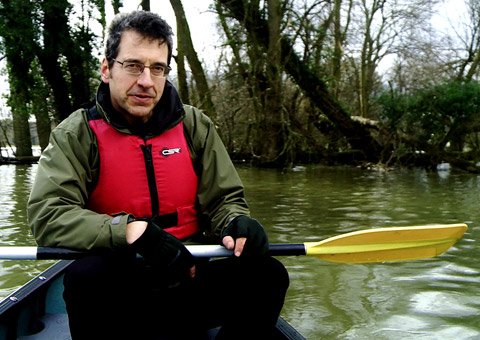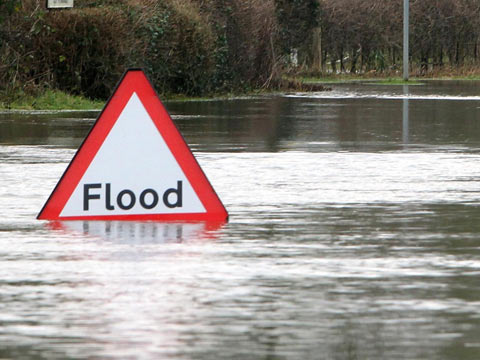The Somerset floods are, in a small way, the English equivalent of New Orleans's Hurricane Katrina: the residents of a wealthy, first-world country find themselves helpless in the face of Mother Nature, and a political class is astonishingly slow to recognise and react to the crisis.
Unless you live in Somerset, it's hard to understand the scale of the disaster. I farm a few miles away, in the Mendip Hills, and when I leave my house it looks as if the sea has reclaimed the whole of the Somerset Levels. Only the thin pencil of Glastonbury Tor stands tall above the white water. When you get closer, you can see car aerials and the tops of apple orchards poking above the rippling surface.
For six weeks 25 sq miles have been under water. So many septic tanks have seeped sewage that tests by microbiologists have shown that bacteria levels are at 60 times the safe limit. Getting to work or school has meant starting the daily commute in a boat through the cold, static water. Just to get downstairs to their kitchens, people have to put on wellies or waders. Moorland was abandoned on Thursday night, and even where sandbags have kept the water at bay, the ground is so saturated it has sometimes risen straight through the floorboards. Farmers are moving huge numbers of livestock, which entails epic amounts of paperwork. And selling fast means selling cheap, so they're dreading ruined finances too.
The government's reaction has been breathtakingly flat-footed. Any disaster is the political equivalent of an open goal, a chance for populists to roll up their sleeves and be seen alongside suffering constituents. But for a month nobody – other than the local MPs – bothered to show up. Even Prince Charles has appeared more in touch with the people, visiting and looking suitably anxious. It took a month before the environment secretary, Owen Paterson, deigned to visit.
Chris Smith, the head of the Environment Agency, has been invisible, not visiting until Friday when the outcry reached fever pitch.
There is an old Italian saying that parodies the habit of blaming politicians for everything: "piove: governo ladro" – "It's raining. Thieving government." No one in Somerset, of course, blames the politicians for the rain. And flood damage is nothing new to this part of the world. Two thousand people died in the Bristol Channel in 1607 because of freak weather; more than 100 sq miles of land was under water for six months in the winter of 1872-73. This is a West Country bayou where, as the agriculturalist Arthur Young observed in 1772, rainwater has "no way to get off but by evaporation". Well, almost. There are plenty of rivers struggling through the flat plain towards the sea: the Axe, Parrett, Brue, Cary, Tone, Sheppey and Yeo. Water has always been vital to the economy here; until 80 years ago, there were 9,000 acres of cultivated and pollarded willows, a tree which likes to have its feet wet.
So the people of Somerset are used to water. They are, by nature, a stoical bunch. What has infuriated them this winter is the perception that this disaster hasn't been caused merely by rainfall, but also by bureaucratic incompetence. The Environment Agency has created a £31m bird sanctuary on the Steart peninsula, but can't find a few million to dredge rivers, remove silt and improve river capacity. Farmers wouldn't mind doing the job themselves, but then they discover that the silt is now classed as a controlled waste requiring removal to a licensed tip. They can't simply dump it on farmland to the side, a practice that for centuries has produced, when combined with the natural peat, an incredibly rich soil. Not only that, they would be asked to take oxygen readings of the water.
It has emerged in the last six weeks that the opposition to dredging isn't just financial, but also ideological. Believing that dredging will make only a tiny difference to drainage, many environmentalists argue that it is also damaging to wildlife. There is a notion that flooding is inevitable and that strategic choices needed to be made. Rob Duck (no, honestly), professor of environmental geoscience at Dundee University, suggests that "as a nation we're going to have to look at certain areas that we can – I wouldn't say sacrifice – return to the sea in order that we can focus our efforts on the cities and other settlements". We should, it's implied, let nature take its course.
Elected politicians, not surprisingly, bridle at the suggestion. Ian Liddell-Grainger, the pugnacious Tory MP for Bridgwater, described one member of the Environment Agency to me as an "obnoxious little turd".
David Heath, his Liberal Democrat colleague, agrees, albeit in milder tones: "A heresy has been allowed to grow up that these are ecological sites in their own rights. They're not; they're largely human constructs. This is a manmade landscape."
The laissez-faire position ignores more than a millennium of ingenuity and industry on the levels. The marshes were originally settled by monks who established monasteries at Glastonbury, Muchelney and Athelney (the "ney" suffix is Anglo-Saxon for "island"). Those inaccessible, remote outposts suited cloistered religious orders needing a retreat from the world, just as the marshy land of Cîteaux suited the first Cistercians. But those monks were adept at reclaiming farmland from the sea and they dug hundreds of miles of drainage channels and rhynes (pronounced "reens").
The dissolution of the monasteries meant that the maintenance of irrigation channels was interrupted, but later Dutch and English engineers took up the challenge, beginning major engineering works that resulted in sophisticated water channels: King's Sedgemoor Drain was completed in the 1790s, the river Huntspill in the 1940s and the river Sowy in the 1970s. Those interventions displayed an economic and ideological commitment to the Levels. Farmers, too, maintained designated stretches. It's not hard to find old hands around here who used to maintain "11 miles per person per year".
But the cause of the flooding is far more nuanced than simply a failure to maintain the waterways. Over centuries, peat has been stripped away, meaning not only that an absorbent sponge has disappeared, but also that the land has sunk even further below sea level. Water just won't flow uphill without the massive investment of pumping. The advent of plastic bags has meant that scarcely anybody uses woven baskets any more, and the area of the willow plantations has fallen to below 3% of what it was before the second world war – with obvious implications for water uptake. Deforestation in the hills, too, means that water isn't being retained farther upstream.
But the greatest mystery of the floods is why the government has taken so long to notice a disaster that has been in the national news for more than a month. Some people suggest it's because we're not in the Home Counties, and there's something in that. But it's not as if this is a backwater in the hands of Her Majesty's opposition: all three of the worst-affected constituencies are held by MPs in the coalition government. The problem has been short-termism and tinkering: Richard Benyon, the minister who had mastered his flooding brief over the previous two and a half years, was suddenly ousted in a reshuffle in 2013.
Reshuffled too have been various quangos: the National Rivers Authority was amalgamated into the Environment Agency, and Natural England and the Somerset Drainage Boards Consortium all compete to decide what needs doing. Sadly, water moves much faster than the groaning wheels of bureaucracy.
Tobias Jones is the warden of Windsor Hill Wood, a residential sanctuary in Somerset for people in period of crisis.











